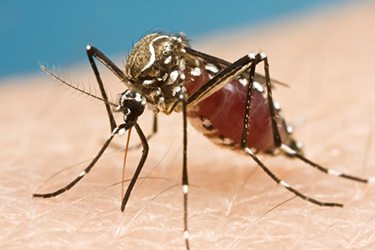As the weather continues to heat up, the risk of being bitten by a mosquito significantly increases. One virus in particular, Zika, has been making global headlines. U.S. health experts continue to categorize the Zika virus as an emergency, while the American public awaits congressional action for resources to combat it.
In the D.C. area, predicting a Zika outbreak would be tough. According to a recent report from WJLA, four people have been infected by Zika in Washington, D.C., 18 in Virginia, and 17 in Maryland. In April, The D.C. Department of Health (DOH) announced the 2016 Enhanced Mosquito Surveillance and Control Plan for trapping and testing adult mosquitoes in all eight wards in the District.
“We are not able to predict how much Zika virus would spread in the region,” D.C. DOH spokesman Ivan Torres told Street Sense. “Recent outbreaks in the continental United States of chikungunya and dengue, which are spread by the same type of mosquito, have been relatively small and limited to a small area.”
Trapping and testing began April 4 and will continue throughout the summer and fall. The Department of Forensic Sciences Public Health Laboratory will test trapped mosquitoes for Zika, West Nile, dengue, and chikungunya viruses.
“This expands the surveillance period started two months earlier than previous years,” Torres said.
While the types of mosquitoes that can become infected with and spread Zika virus are present in the region, Aedes Albopictus and Aedes Aegypti , all six [as of June 8th] of the District residents who were confirmed to have Zika contracted it from international travel in Zika-affected areas, according to Torres.
“There have been no confirmed locally acquired cases of Zika among District residents,” he said. “Testing of mosquitos in D.C. for Zika is ongoing and to date there has been no evidence of the virus in local mosquitos. Therefore, we expect the risk of acquiring Zika among persons in the homeless community to be low.”
For the homeless community, prevention resources will be available through public distribution events. The next D.C. DOH outreach event is planned for July 16 in every ward. Packets containing mosquito repellent, mosquito dunks, and educational information will be made available.
“The May 14 events yielded a total of 1,446 Zika prevention kits distributed,” Torres said. “Considering that there are no human cases resulting from local transmission, we are not able to determine the exact risk.”




